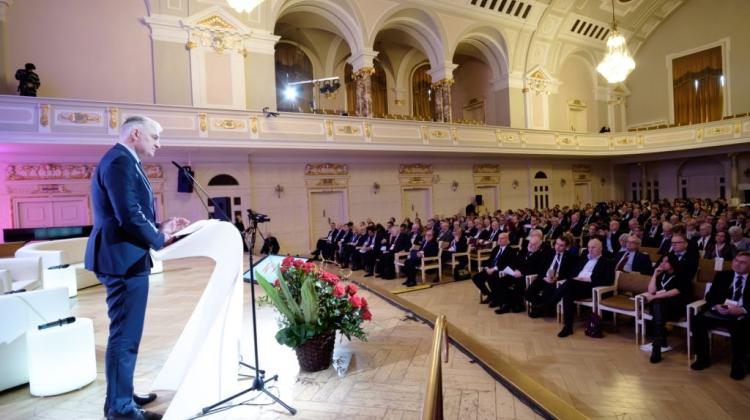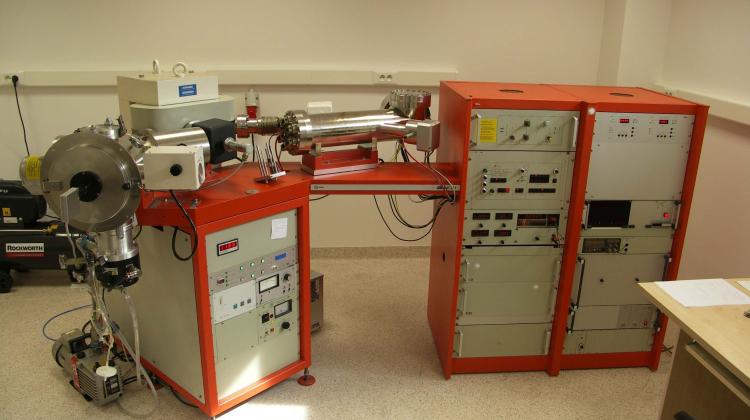Gowin: Polish science must undergo profound changes

Polish science must undergo profound changes - from structural changes to formulating new directions of its development - said Deputy Prime Minister, Minister of Science Jarosław Gowin during the inauguration of the academic year at Adam Mickiewicz University in Poznań.
"These changes, however profound, must be evolutionary, organic and possibly broadly acceptable" - noted Gowin.
Minister of Science and Higher Education reminded that in September 2017 new draft law on science and higher education will be presented. Three independent teams selected in a competition organized by the Ministry of Science have been working for several months on the assumptions of the new law.
"This ceremony opens a very important academic year. This year, I believe, we will conclude the wide debate on the ultimate model of science and higher education. We are all aware that the Polish science, Polish universities need calm, preceded by a deep deliberation, dialogue, yet profound changes" - Deputy Prime Minister said on Monday in Poznań.
As he spoke, the starting point for change should be the current position of Polish science, Polish universities in the international arena. The Minister of Science pointed out that in terms of the level of economic potential Poland is 24th in the world, while its position in terms of investments in science is not quite "optimistic."
"It is clear that Polish science is dramatically under-funded in comparison with the possibilities. This must change, and it begins to change. Last week, the government adopted a draft of the new budget. We anticipate an increase in public spending on science, and this does not include European funds. Public funds increased by 550 million zlotys is already a significant increase, although I admit I do not consider this amount to be satisfactory" - said Deputy Prime Minister.
He added that in Poland there is also a "structural problem with Polish universities". With regard to the recently announced strategy, he said that Polish science now pays the price for formulating mainly teaching tasks for universities over the last twenty years. The changes, according to the minister, were supposed to "free Polish society from the period of the enormous backwardness" in relation to higher education. He emphasised that - even though this goal has been achieved - Polish science is now paying an enormous price for it, including the lower importance of research.
Deputy Prime Minister said that the changes are necessary and as of the beginning of October they have already started with the introduction of deregulation bill, which is designed to reduce unnecessary bureaucracy. He also reminded that from January 1 the way of financing universities would change.
"I am aware that this change is controversial, it raises concerns, but I think this change is necessary, because the main source of the problems we have with universities (...) especially in the situation of demographic decline, is the frequent lowering of requirements for students (...) This lowering of the level of requirements, the mass approach is a result of the existing funding rules" - he pointed out.
"The general direction is that we are moving away from financing based on the number of students. We were looking for good solutions, good practices abroad not just to adapt them to the Polish reality without a deeper thought, but to transform them in a creative way. And there are good models to draw from, in this case the Scandinavian model. After many years of research, Scandinavians came to the conclusion that the proper way to finance colleges is based not on the number of students, but the ratio between the number of academics and the number of students" - he explained.
As he spoke, the new draft law on the Polish science, which the minister wants to present in September 2017 “must be prepared in a dialogue, and this means a dual dialogue, on the one hand between the government and academia, but on the other hand - which is no less important, dialogue within this community".
The shape of the bill is to be open, but, according to Gowin, focused primarily on expanding the autonomy of universities guided by a new philosophy of law, "reducing the matter of regulations, and leaving the widest possible range of issues to be regulated at the level of university statutes".
The second direction would be focusing on relations between science and economy and the internationalisation of science together with the National Academic Cooperation Agency. Another important direction would be the creation of a new type of university and research universities.
"We can not afford to continue the pace of development of Polish higher education and science as in the past twenty years. Universities develop, and Adam Mickiewicz University is a great example, but the world is developing faster. It is time to pick up the pace, and one of the main vehicles of more rapid development of science must be research universities, or colleges that offer elite education" - said Gowin.
In October, in parallel to the work of three teams of experts on the concepts of the new law, begin the series of debates, discussions, conferences devoted to the problems of Polish science and higher education. Their conclusion will be the National Congress of Science in September 2017 during which, based on dialogue with academia and within the academic community, the draft of the new law will be presented.
PAP - Science and Scholarship in Poland
ajw/ agt/ mrt/
tr. RL
Przed dodaniem komentarza prosimy o zapoznanie z Regulaminem forum serwisu Nauka w Polsce.


















